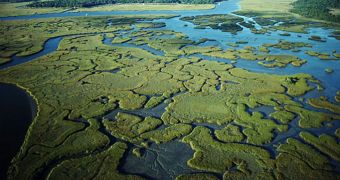On April 20, the Deepwater Horizon drilling rig, operated by British Petroleum, exploded, and then sunk into the water of the Gulf of Mexico, killing 11. As this happened, massive amounts of oil began pouring into the ocean, and the oil slick started expanding fast. The Mississippi Delta and he Louisiana coastline were affected by crude stains, and some oil may have also entered the Loop Current. If that was indeed the case, then the Florida Everglades could be threatened. A research team now gets funding to investigate if any harm has, or will, come to the Everglades.
This area, currently designated as a natural park, is made up of mangrove swamps, sawgrass prairies and subtropical jungles, which together cover more than 1.5 million acres. Also known as the River of Grass, this region would stand to be severely impacted by even the smallest amounts of crude that would contaminate it. In a bid to learn if this is the case, the US National Science Foundation (NSF) has recently awarded the team managing the NSF Florida Coastal Everglades Long-Term Ecological Research (LTER) site with a grant to study these potential impacts.
The rapid response grant is aimed at promoting research in such a way that conclusions are available as soon as possible. “The Florida Coastal Everglades LTER site is located within the boundaries of Everglades National Park, an important natural resource. This research will document the extent of the spill's impact on the Everglades ecosystem as a whole,” says NSF Division of Environmental Biology (DEB) expert Todd Crowl, who is the program director of the LTER. The DEB founded the work together with the NSF Division of Ocean Sciences (DOS).
“Oil and dispersants are toxic to marine plants like seagrasses, and mangroves may be smothered and die if oil slicks wash ashore. Significant oil reaching the Everglades could drastically alter marine animal and plant distributions, the structure of the food web, and the cycling of organic matter for years or decades after the spill,” says Florida International University (FIU) scientist James Fourqurean. He and FIU colleague Evelyn Gaiser are the main beneficiaries of the NSF rapid response grant.
“This NSF grant is one of many Gulf oil spill-related rapid response awards made by the federal agency. NSF's response involves active research in social sciences, geosciences, computer simulation, engineering, biology, and other fields. So far, the Foundation has made more than 60 awards totaling nearly $7 million,” officials at the Foundation say.

 14 DAY TRIAL //
14 DAY TRIAL //